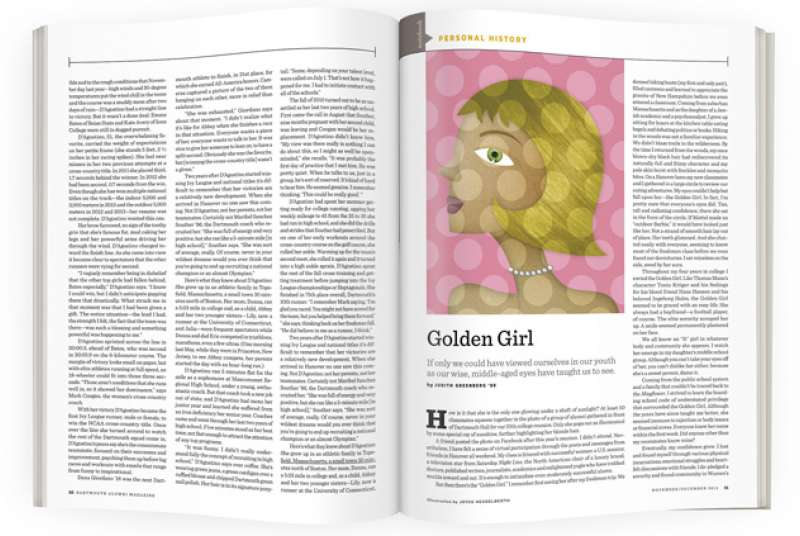
Golden Girl
How is it that she is the only one glowing under a shaft of sunlight? At least 50 classmates squeeze together in the photo of a group of alumni gathered in front of Dartmouth Hall for our 25th college reunion. Only she pops out as illuminated by some special ray of sunshine, further highlighting her blonde hair.
A friend posted the photo on Facebook after this year’s reunion. I didn’t attend. Nevertheless, I have felt a sense of virtual participation through the posts and messages from friends in Hanover all weekend. My class is littered with successful women: a U.S. senator, a television star from Saturday Night Live, the North American chair of a luxury brand, doctors, published writers, journalists, academics and enlightened yogis who have trekked worlds inward and out. It’s enough to intimidate even moderately successful alums.
But then there’s the “Golden Girl.” I remember first seeing her after my freshman trip. We donned hiking boots (my first and only pair), filled canteens and learned to appreciate the granite of New Hampshire before we even entered a classroom. Coming from suburban Massachusetts and as the daughter of a Jewish academic and a psychoanalyst, I grew up sitting for hours at the kitchen table eating bagels and debating politics or books. Hiking in the woods was not a familiar experience. We didn’t blaze trails in the wilderness. By the time I returned from the woods, my once blown-dry black hair had rediscovered its naturally full and frizzy character and my pale skin burst with freckles and mosquito bites. On a Hanover lawn my new classmates and I gathered in a large circle to review our outing adventures. My eyes couldn’t help but fall upon her—the Golden Girl. In fact, I’m pretty sure that everyone’s eyes did. Tan, tall and radiating confidence, there she sat in the front of the circle. If Mattel made an “outdoor Barbie,” it would have looked just like her. Not a strand of smooth hair lay out of place. Her teeth glistened. And she chatted easily with everyone, seeming to know most of the freshmen class before we even found our dormitories. I sat voiceless on the side, awed by her aura.
Throughout my four years in college I envied the Golden Girl. Like Thomas Mann’s character Tonio Kröger and his feelings for his blond friend Hans Hansen and his beloved Ingeborg Holm, the Golden Girl seemed to be graced with an easy life. She always had a boyfriend—a football player, of course. The elite sorority scooped her up. A smile seemed permanently plastered on her face.
We all know an “It” girl in whatever body and community she appears. I watch her emerge in my daughter’s middle school group. Although you can’t take your eyes off of her, you can’t dislike her either, because she’s a sweet person, damn it.
Coming from the public school system and a family that couldn’t be traced back to the Mayflower, I strived to learn the boarding school code of understated privilege that surrounded the Golden Girl. Although the years have since taught me better, she seemed immune to rejection or body issues or financial stress. Everyone knew her name within the first week. Did anyone other than my roommates know mine?
Eventually, my confidence grew. I lost and found myself through various physical incarnations, emotional struggles and heartfelt discussions with friends. I de-pledged a sorority and found community in Women’s Issues League meetings, where we actually discussed how “women” should be spelled (womyn?) to avoid referring to ourselves by reference to men. I even learned to canoe down the Connecticut River and jog around Occom Pond in the mornings. My ease with languages and literary analysis got me noticed, if not by football players, then by my professors (although one frat boy who asked me to his formal did actually become a professional baseball player).
That was 25 years ago. Since that time I’ve found my own “gold” within, and it’s not from the few highlights I have now added to my graying mane. In fact, when Facebook suggested that I “friend” the Golden Girl (she popped up under “people you may know”), her photo didn’t incite a bit of envy in me. That was the girl I found so perfect? I now appreciate a more unusual face, a beauty that comes from the unexpected. What do we really see at age 18? If only we could have viewed ourselves in our youth as our wise, middle-aged eyes have taught us to see. How golden we would appear to ourselves.
But if I believed my perspective to have evolved past my insecure beginnings at college, then that reunion photo was my undoing. Of all of the images of happy, successful classmates posted from the reunion I missed, the one with the light unnerved me, evoking feelings I thought I’d left behind a quarter century ago. In the midst of assembled classmates, a single ray shines on one woman. “Check out the golden light shining upon her” another classmate comments. “As if she didn’t look great enough without divine intervention.” Yep—I wasn’t alone in seeing it. She’s not the prominent senator or the established New York Timesreporter, she’s not the celebrity or the student-made-good and returned to campus as tenured professor, but she’s still smiling and looks exactly like she did in the fall of 1984, a Golden Girl. Darn those reunions.
Judith Greenberg teaches at the Gallatin School for Individualized Study at New York University. She is the author of Trauma at Home: After 9/11 (2003) and is working on a book about trauma and family stories. She taught in Dartmouth’s French department as a visiting assistant professor in 1998.










